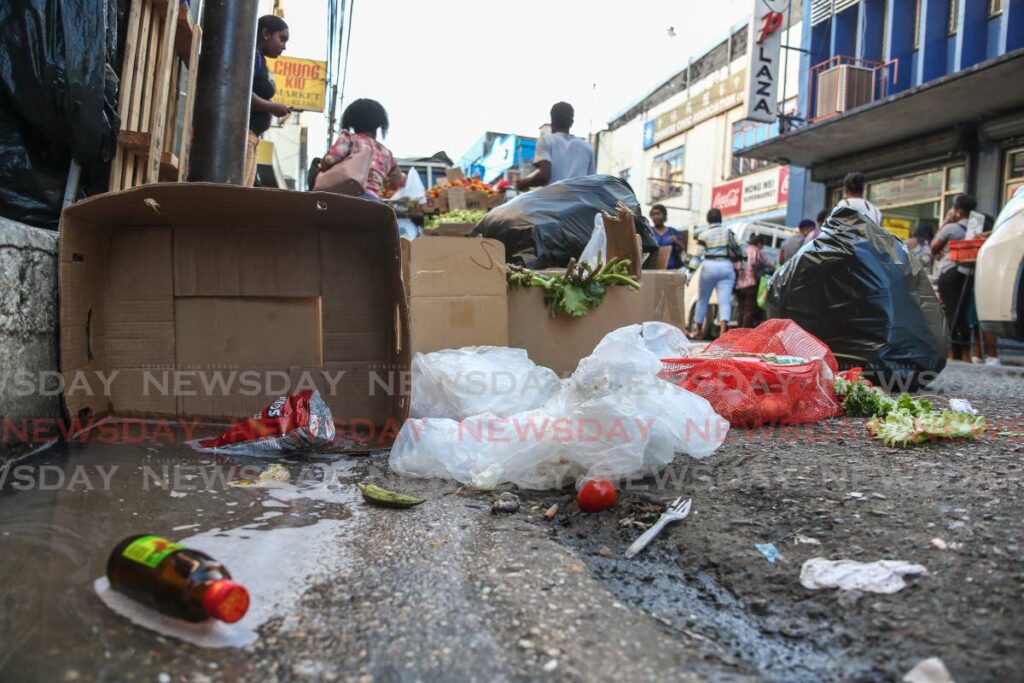Trinis dump 154,000 tons of food waste each year

TT nationals are wasting too many materials especially food, lamented a report by a Portugal-based firm, presented on Wednesday to Minister of Public Utilities Marvin Gonzales at a function at his Port of Spain office. The Solid Waste Management Co Ltd (SWMCOL) had commissioned a report on waste characterisation in TT, by Portuguese firm KWL/Lipor whose representatives Filipe Carneiro and Adaia Sole were present.
SWMCOL chairman Ronald Milford said a 2010 study in TT showed the annual amount of waste entering local landfills was 700,000 tons. He hoped the current report could transform how waste is managed in TT, as fed by vital data to aid the establishment of TT's first sanitary engineered landfill at Forres Park. Milford said local government reform would empower municipalities to manage their own waste and so could result in savings.
Gonzales hailed the new report as a milestone accomplishment and said the Government had done a lot of work on its Corporate Waste Management Plan.
He said while some may say the Government was slow in its beverage container policy, this could be only be done in line with a holistic plan plus a legislative policy.
A beverage container policy, he said, would aim to incentivise people to return empty containers to reclaim a deposit.
Gonzales said the new report, like the 2010 report, showed the composition, characteristics and quantities of waste.
Pointing the way forward, he said he expected Cabinet to approve a solid waste policy within a month, to be valid for the next ten years.
Gonzales announced that SWMCOL would be transformed from a limited liability company under the Companies Act to a statutory corporation.
He said the reuse, recycling and proper management of waste would minimise waste and the harm it causes, while generating opportunities for new industries. "We'll build a future we can all be proud of."
Carneiro, presenting his findings, gave figures to suggest TT nationals throw away 154,000 tons of food waste each year.
This was based on him saying food waste comprises 20 per cent of the 700,000 tons of total waste to landfills in TT.
However SWMCOL sources told Newsday the dumped food materials included both edible foodstuffs and food waste by-products such as potato peelings, from households and establishments like restaurants and hotels.
The food waste was also counted along with garden waste (11 per cent) to make biomass the biggest constituent of landfills.
The main categories of waste products annually were biomass (237,782 tons), paper (131,737 tons), plastic (94,168 tons), beverage containers (67,325 tons) and construction and demolition materials (64,515 tons.) Carneiro said the 67,325 tons of beverage containers, included glass and plastic bottles, clear and coloured.
He advocated a deposit scheme to encourage the collection/return of used bottles. Newsday later asked Gonzales if sufficient economies of scale could be attained in TT to make recycling of beverage containers economically viable and he replied yes.
Carneiro presented figures to that from 2010 to 2022 the proportion of TT's waste which was recyclable (in the event of facilities being provided) had actually dropped from 83 per cent of all waste to 76 per cent of all waste. Correspondingly the non-recyclable waste had grown from 16 per cent to 23 per cent.
One non-recyclable item he noted was babies diapers/pampers. He later told Newsday diapers were non-recyclable because they were composed of multiple materials including the absorbent material, the plastic outer lining, plus glue holding all the constituent layers together. The fact these materials were compressed together also made diapers non-recyclable, Carneiro added.
Regarding dumped food, Carneiro said some countries in Europe make it mandatory for such food items - presumably in edible condition - to be first made available to needy persons. He said in TT the State could work with restaurants and the like to follow suit, thereby helping people and reducing the volume of waste to dispose.


Comments
"Trinis dump 154,000 tons of food waste each year"